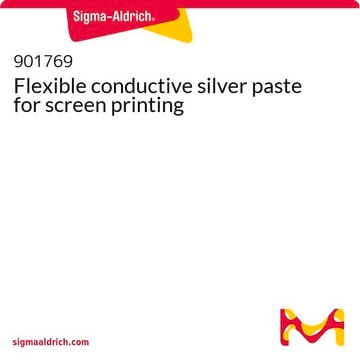Alle Fotos(3)
Wichtige Dokumente
200689
Ethylcellulose
viscosity 10 cP, 5 % in toluene/ethanol 80:20(lit.), extent of labeling: 48% ethoxyl
Synonym(e):
ethylcellulose
Anmeldenzur Ansicht organisationsspezifischer und vertraglich vereinbarter Preise
Alle Fotos(3)
About This Item
Empfohlene Produkte
Form
powder
Qualitätsniveau
Selbstzündungstemp.
698 °F
Kennzeichnungsgrad
48% ethoxyl
Brechungsindex
n20/D 1.47 (lit.)
Viskosität
10 cP, 5 % in toluene/ethanol 80:20(lit.)
Übergangstemp.
softening point 155 °C
Dichte
1.14 g/mL at 25 °C (lit.)
Suchen Sie nach ähnlichen Produkten? Aufrufen Leitfaden zum Produktvergleich
Allgemeine Beschreibung
Ethyl cellulose(EC) is a hydrophobic andphysiologically inert cellulose derivative. It is widely used to preparephysiological dosage forms. It can also be used as a polymer coating,particle emulsion stabilizer and in pharmaceuticallyuseful aqueous latex dispersions.
Anwendung
Ethyl cellulose can be used as a starting material to prepare zein-based nanofibers for controlled drug release. The addition of EC improves the solubility and mechanical properties of the composite nanofibers.
It can be used to prepare graphene-based ink for inkjet printing. This graphene oxide ink printed onto ITO surfaces can be used as an electrode for label-free DNA sensing.
Owing to its unique features such as gastroresistance, biocompatibility, and degradation to non-toxic and readily excreted products, EC is widely used in oral and topical drug dosage forms for the controlled release of the drug.
It can be used to prepare graphene-based ink for inkjet printing. This graphene oxide ink printed onto ITO surfaces can be used as an electrode for label-free DNA sensing.
Owing to its unique features such as gastroresistance, biocompatibility, and degradation to non-toxic and readily excreted products, EC is widely used in oral and topical drug dosage forms for the controlled release of the drug.
Leistungsmerkmale und Vorteile
- Non-toxic
- Stable
- Compressible
Lagerklassenschlüssel
11 - Combustible Solids
WGK
WGK 1
Flammpunkt (°F)
Not applicable
Flammpunkt (°C)
Not applicable
Persönliche Schutzausrüstung
Eyeshields, Gloves, type N95 (US)
Hier finden Sie alle aktuellen Versionen:
Besitzen Sie dieses Produkt bereits?
In der Dokumentenbibliothek finden Sie die Dokumentation zu den Produkten, die Sie kürzlich erworben haben.
Kunden haben sich ebenfalls angesehen
Arif Z Nelson et al.
Proceedings of the National Academy of Sciences of the United States of America, 117(11), 5671-5679 (2020-03-05)
Microfluidic tools and techniques for manipulating fluid droplets have become core to many scientific and technological fields. Despite the plethora of existing approaches to fluidic manipulation, non-Newtonian fluid phenomena are rarely taken advantage of. Here we introduce embedded droplet printing-a
Kifayat Ullah Shah et al.
TheScientificWorldJournal, 2012, 842348-842348 (2012-06-01)
The design and fabrication of sustained/controlled release dosage forms, employing new excipients capable of extending/controlling the release of drugs from the dosage forms over prolonged periods, has worked well in achieving optimally enhanced therapeutic levels of the drugs. In this
Oguzhan Gunduz et al.
Pharmaceutical research, 30(1), 225-237 (2012-09-08)
To investigate a new microfluidic method for the continuous preparation of hollow-shell nanoparticles of a hydrophobic polymer and the simultaneous encapsulation within these of a hydrophilic active pharmaceutical ingredient. A specially designed and constructed microfluidic device which facilitates at a
Tetsuya Ozeki et al.
Biological & pharmaceutical bulletin, 35(11), 1926-1931 (2012-11-06)
Production of drug nanoparticles is an effective strategy to enhance solubility and oral absorption of water-insoluble drugs. The handling of drug nanoparticles has been an important issue in drug formulation because nanoparticles easily aggregate each other and redispersion of these
Ghulam Murtaza
Acta poloniae pharmaceutica, 69(1), 11-22 (2012-05-12)
Ethylcellulose (EC) based microencapsulated drug delivery systems are being extensively studied throughout the world for achieving extended drug release and protecting the core substance from degradation. The in vitro evaluation of EC microcapsules have elucidated that their particle characteristics are
Unser Team von Wissenschaftlern verfügt über Erfahrung in allen Forschungsbereichen einschließlich Life Science, Materialwissenschaften, chemischer Synthese, Chromatographie, Analytik und vielen mehr..
Setzen Sie sich mit dem technischen Dienst in Verbindung.






